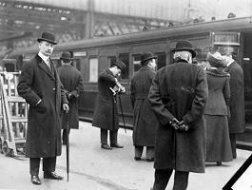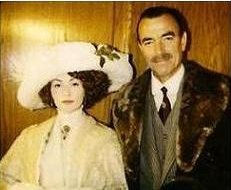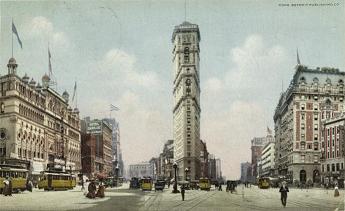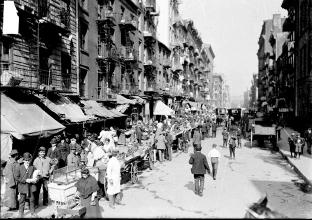THE EDUCATION OF ROSE DAWSON: PART II
Chapter Two
Situation
In contrast to her harrowing
experience the previous night, Rose slept quite well this time. When she awoke
the next morning, she felt rejuvenated. It was a new week, and she was eager to
put the recent negative experiences behind her and continue her conversion into
a common girl.
One thing any young woman of
limited means needed was a job. Rose had been thinking about what she could do
for a living ever since she confidently told Jack on the afternoon of the thirteenth,
after they had dined with Angus for the first time, that her delicate hands
were made for work. The thought of work became stronger once she decided to run
off with Jack right before the iceberg struck, and stronger still after she was
picked up by the Carpathia. Now that Mr. Word had praised her for her
command of mathematics, she knew that she had at least one skill she could use
to make a contribution to society.
Becoming a moving picture actress
or the next Isadora Duncan was still in her dreams, but as much as she wanted
self-fulfillment from any occupation she entered, she still had to meet her
basic needs—food, clothing, and housing—first. She was receiving all three at
the shelter, but knew that she could not rely on the SA forever, nor did she
want to. There were many other women in New York alone who were as equally
deserving of its help as she.
Despite her lack of work
experience, Rose enjoyed some advantages besides the shelter. The money she
salvaged from Cal’s jacket served as a cushion, allowing her to search for work
at a more relaxed pace instead of desperately accepting whatever came her way.
Women who were less well-endowed in skill or fortune—the two seemed to go
hand-in-hand—were known to sell their bodies to survive; Rose saw this even in
her former life.
That was something she did not
intend to emulate.
Father, Jack, Mr.
McKenzie…Mother. I promise you all that however dire my circumstances, I will
never become a prostitute. I would rather beg and sleep on the street than
exchange my flesh for a man’s desires and his money. If I had wanted to peddle
myself to the highest bidder, I would have given my hand in marriage to Cal,
and it would have been safer. That would have pleased one of you, but it would
have dishonored what the rest of you stood for.
*****
After freshening up and having
breakfast, Rose saw Cadet Hill in the lobby. "Good morning, Miss Dawson! I
hope you’re feeling better today," greeted Cadet Hill warmly.
"I think I am, Miss Hill.
Thank you."
"May I ask you a sensitive
question?"
"Certainly."
"Was the thief ever
caught?"
"One of them. The other one
is still being sought, and Jenny agreed to help identify her if the police
arrest somebody."
"So, the other thief is a
woman. But I’m not all that surprised. I’ve seen a number of girl pickpockets
during my brief time here. They’re even harder to suspect because of their
sex."
"I did not suspect a woman
at first, either. Both of them fooled me because they were so well-dressed. If
Jenny had not exposed the man, he would have escaped with my money. But it
turned dangerous."
"I take it there was a big
fight," said Cadet Hill, as she recalled the ice packs Amsterdam and Jenny
held and the bruise on Jenny’s face.
"There certainly was, and
Jenny suffered the most after being knocked to the ground. But Amsterdam was
just inexhaustible. You may not believe this just by looking at him, but he
challenged a man young enough to be his grandson and beat him. He suffered some
hits, but he was the one standing in the end."
"Were you hurt, Miss
Dawson?"
"More emotionally than
physically. The thief grabbed me by the neck and was about to cut my face with
a knife when I bit and punched him. I even threw my coins and hat at him. I did
not think about being hurt; that was how angry I was." Rose stopped for a
breather before continuing. "I did not hurt him, but I occupied his
attention long enough for Amsterdam to surprise him from behind. Jenny also
helped by tossing her water bottle at him. That really hurt."
"So, you can fight, Miss
Dawson. Even though the Army discourages violence to resolve our problems, I
wish I could have been there to see you help teach the thief a lesson."
"I doubt you would want to
see such a base display of human behavior, Miss Hill. Besides, I did not do
much. Amsterdam and Jenny did most of the work…and took all of the blows. I owe
my safety to them." Rose breathed a sigh of relief, as if the fight had
just ended. "Still, it was a very harrowing experience for me. It happened
rather quickly, so it has not sunk in until now."
"I see what you mean, but
you were still very brave to confront a thief," said Cadet Hill, who then
wisely decided to change the subject. "So, what are your plans for
today?"
"I would very much like to
go out and find a situation that is suitable for me."
Cadet Hill’s reaction was a
combination of concern and amazement. "Are you planning to move on so
soon, Miss Dawson? I’d certainly understand if you intend to, but I also hope
we have been adequately providing for you so far."
"You most certainly have, Miss
Hill, so please do not think the Army’s assistance has been inadequate. But I
have to make myself useful in this new life of mine. I have no previous work
experience, but I know I can do something."
"I think you can, too, Miss
Dawson. But it still seems so soon for you to do this after all you’ve been
through."
Rose considered Cadet Hill’s
words before responding. "Yes, it is. But suppose we take away all I have
been through before I arrived in New York. Imagine that I am just a
country girl who came to this big, unknown city to pursue my dream of
becoming…an actress, for instance. Would that be any different from you leaving
Canada because you wanted to follow in Madam Booth’s footsteps? That must have
been a big decision for you, too."
Cadet Hill was pleasantly
surprised by Rose pointing out a similarity in their lives. Both of them were
young women who left their families to pursue their dreams, although Rose had
to clear a few major obstacles to get to this point. "Yes, you’re right.
That was the opportunity of a lifetime, and I’m glad I took it," said
Cadet Hill.
"Some opportunities only
come once," said Rose. "Would you agree that it is better to try
something and fail than to never try it at all?"
"Absolutely. You’re amazing,
Miss Dawson. For that, I salute you. But just remember that you’re still our
valued guest. If there’s anything we can help you with, even finding a
situation, then please do ask."
"I will, thank you."
"One more thing. It should
rain today. Do bring an umbrella with you."
"Oh, yes. And thank you
again, Miss Hill."
*****
Rose returned to her room to
retrieve her umbrella. Then she left the shelter and headed west. It had not
begun to rain yet, but the sky was overcast. Rose found herself among the
morning rush hour crowds once again. This time, she actively searched for a
paperboy hawking the New York Times. She found one at the corner of East
14th Street and Second Avenue, and paid a penny for her copy. As Titanic
was still big news, she deliberately skipped the pages covering it and went
straight to the Situations section. This was uncharted waters for her.
As a Bukater, she had read the Times, but never its Help Wanted section.
No woman in her social circle ever so much glanced at it, and her mother
actively discouraged it. She was expected to find a rich husband who would
provide for her, and this meant subordinating her body and mind to his wealth
and whim.
Even before Titanic, Rose
knew that a lot of women worked for a living. She saw that when she walked the
streets of Philadelphia and New York; they could not be fully kept from her
sight. Even if they were, Trudy was always there to remind her that not all
women were as pampered as she. Women did not make as much as men, but they
worked to support themselves and their families nonetheless.
She reminisced one of Ruth
Bolton’s lines on her choice to become a physician in The Gilded Age: "I
just begin to see what I can do in it, and what a noble profession it is for a
woman. Would thee have me sit here like a bird on a bough and wait for somebody
to come and put me in a cage?" It was a moving recollection for
Rose–and an overwhelming one, too.
Will I ever be as accomplished
as the fictional Dr. Bolton, much less Drs. Curie and Blackwell? I would
be happy if I could just emulate Harriet Quimby.
But everyone, no matter how
distinguished, has to start somewhere. A physician or scientist Rose would
likely never be, but if what Commander Booth said about her was true, she had
gifts the rest of the world had not yet seen. All she needed was a place to
demonstrate them.
So, Rose commenced the pursuit of
her career by flipping over to page twenty-one of the Times, where the Situations
Wanted and Help Wanted sections were posted. Both sections were
divided by sex. While the Situations Wanted section was almost evenly
split between men and women, the Help Wanted section was a lot longer
for men. So few options for us. Do they think women and work cannot mix,
too? Perhaps not with most of the work that is on offer in the New York
Times. The truly dirty and menial jobs for women would not be advertised
here. Rose harkened back once more to her mother’s words from that Sunday
morning: "We’re women. Our choices are never easy."
True, Mother, but they do not
seem so hard when we have hardly any choice at all.
For the few positions that
mentioned pay, a couple of quick calculations told Rose that the jobs on offer
would not pay quite enough for a woman to live on her own in the city. Her residence
at the shelter suddenly became a bigger advantage than she thought.
She soon got over this imbalance
and studied the few openings for women in the Help Wanted section. They
did not look very promising. Housekeeping was out of the question, not because
Rose did not want to sweat and toil with her hands–which she was willing to
do–but because she could end up in a wealthy household where she could be
recognized. That was also why she could not work as a private cook, not to
mention the fact that her experience in cooking was limited to boiling an egg
and making toast once, with some assistance from the Bukaters’ chef, just to
see that it was not too hard to prepare her own meal.
Stenography, however, was
something that Rose thought she could do, even if she had no prior experience
in it. She believed herself to be a good listener–after all those lectures
from Mother–and note taker–and having to remember all those mannerisms
at finishing school–and these qualities, combined with her near flawless
penmanship, led her to think she was a worthy candidate for any stenographer
position. One happened to be advertised in the Help Wanted Female section,
albeit without an address. That required Rose to go to Times
headquarters in Times Square to leave her contact information.
*****
To get
to Times Square, Rose had to take the IRT subway north once again and get off
one stop after Grand Central. The neighborhood was not one with which she was
too familiar, and for good reason. It had long garnered a reputation for cheap
thrills and as a haven for the world’s oldest profession. Still, there were
some respectable establishments in the area, like the Hotel Astor, the land for which Colonel Astor’s cousin, William Waldorf
Astor, leased to a developer to build a hotel that would rival the best hotels
in the city, including the Waldorf-Astoria on
After
seeing his cousin’s family gain the upper hand in the squabble, William moved
to
Rose
met William once – during her recent vacation when she stopped in
Later,
when J.J. boarded Titanic at
Rose
had met with J.J. several times before and with Madeleine once previously. She
found it easier to talk to them than to William. They welcomed her willingness
to befriend them because most of society had shunned them after J.J. divorced
his first wife and married a woman less than half his age. Hence, they were
fine with Rose addressing them by their first names, a practice Ruth
discouraged, as long as it helped them make the transition back into society.
Since Rose and Madeleine were about the same age, they got along well, and
Madeleine even gave Rose a few tips on marriage and pregnancy.
The
Astors, along with Mrs. Brown, were among the few rich people whom Rose respected.
On the Carpathia, Rose wanted to
check up on Madeleine, given her delicate condition and the fact that she was
alone, but was afraid of running into her mother or Cal. She had another chance
to reach out to Madeleine after they disembarked in


(L) William Waldorf Astor
(left) at
Rose took some time to study the
Hotel Astor. The Bukaters never stayed there during their trips to
But her first order of business
was to find a situation. After taking a few minutes to admire the scenery
around her, she returned her attention to locating the

Times Square in the early 1900s (
"You’re in luck, miss,"
said a clerk who handled public inquiries about the Help Wanted ads
listed in the newspaper. "The employer is conducting interviews in his
office until noon without requiring appointments. You could just walk in and
wait your turn."
Rose became excited. "Where
is he located?"
"His address is 128 Essex
Street, second floor. Do you know how to get there?"
"Can you kindly show
me?"
"All right. How did you get
here?"
"By subway."
"The easiest way is to take
the same subway downtown and get off at ckercker Street. Then go south to
Houston Street and turn east. Then turn south on Essex Street."
"Thank you. I will try to
remember that. I would also like to place an advertisement in your Situations
Wanted section. How can I do that?"
The clerk took out a sheet of
paper. "Just write down your name, age, address, phone number if you have
one, the type of situation you seek, and then list any relevant skills you
have. There is a small fee for this service, and your advertisement will run
for one week."
Rose thought for a moment about
how to make herself stand out, and after taking another look at the listings
already in the newspaper for guidance, finally settled on the following:
RELIABLE
YOUNG WOMAN (17) with good writing, listening, and language skills seeks
suitable position to employ them. Miss Dawson at 316 E. 15th St.
It was a vague description, but
since Rose did not want to limit herself to one or two positions, she
deliberately made it vague to attract more prospective employers, although she
was aware that such a description could attract prospective employers from her
former class. This she had to risk because she needed a job, and she could
always turn down a potential position if she did not think it was a good match.
However, she did not know the shelter’s phone number, if one existed, so she
could not write it down. Nor did she have any work experience to advertise. She
wanted to minimize her deficiencies and promote her strengths–two of the rules
she learned at finishing school. Again, the training she received there had
come back to help her in an unexpected way. She then paid her fee to the clerk
and left to take the subway downtown.
*****

The Lower East Side, 1908
Some twenty minutes later, Rose
emerged from the Bleecker Street station and, after getting further directions, made her way south to Prince Street to catch an eastbound trolley towards Essex Street––her first trip on one in New York. It
seemed that getting to the job interview was half the fun, and Rose enjoyed the
trolley trip tremendously. She barely contained her excitement over riding one
for the first time, as well as her very first chance to showcase her qualifications in her
very first interview. Some twelve blocks later, she reached Essex Street, one of
the main thoroughfares of the Lower East Side. This was a distinct neighborhood
that hosted many recent immigrants from Europe, and it showed in the dress and
language of its residents, most of whom were Jews from Eastern Europe. Even
many of the store signs boasted what she assumed was the alphabet of their
native language. As Rose turned south again and walked straight into the heart
of the Lower East Side, she studied the life on its streets with much interest.
She could see that the neighborhood was densely populated, with little or no
space between buildings and hardly a tree in sight. Even the sidewalks could
not accommodate all the merchants, so many of them conducted their business
along the streets with their makeshift stands and pushcarts. This slowed down
the flow of traffic, but most people did not seem to mind.
Neither did Rose. Chestnut
Hill this is not, she thought, as she compared and contrasted this
neighborhood with her old one in Philadelphia.
Like all close-knit
neighborhoods, its residents knew who lived there and who did not, and some of
them stopped their activities to stare at Rose as she walked down Essex at a
moderate pace, taking her time to soak in the ways and pace of life here, as if
the interview could wait. She heard soft voices speaking in a foreign tongue
that she did not understand, and figured that she was the subject of their
exchange. But that did not bother her because she was too enthralled by this
area. It was crowded, dirty, and smelly, to be sure, but it was also bustling
with activity and evoked memories of the steerage party on Titanic,
which featured many would-be immigrants. Some of those people at the party
could have been headed here, she speculated with a mixture of remorse and
appreciation. But she saw few signs that the sinking had struck home here, or
maybe enough time had passed for most people to resume their daily routines.
The Lower East Side so fascinated
Rose that she overshot 128 Essex Street and had to turn back to locate the
building, which was situated at the corner of Essex and Rivington Streets. She
went up the stairs to a second floor office, where two other young women were
waiting their turn to be interviewed. She gave each of them a polite nod, which
one of them returned, and assumed a seat next to the last woman. She was
dressed pleasantly enough, and so did not have to return to the shelter to change.
Fifteen minutes later, it was her turn to step into an office for her very
first job interview.
The prospective employer was a
short, heavyset man who spoke with a thick accent, so his Ws sounded like Vs
and Vs sounded like Fs. He was known as Mr. Anielewicz, and he wasted no time
getting down to business. No sooner had Rose sat down in front of him than he
asked her his first question: "Do you speak Yiddish?"
Rose thought that this was an
unusual first question. So that was what the people on the street were
speaking. "No, I do not, but I am versed in French and have some
exposure to Italian."
Mr. Anielewicz raised his
eyebrow, but he still did not seem all that impressed. "That’s nice, but I
don’t have too many French customers and only a few Italians. What about
German?"
"Unfortunately, I did not
take up German," replied Rose, who remained hopeful.
“What is your name, young lady?”
Mr. Anielewicz had been so keen on conducting the interview that he did not
even bother to ask Rose for her name when she walked into his office.
“Rose Dawson.”
“How do you spell it?”
“D-A-W-S-O-N.”
Mr. Anielewicz frowned. “
“Why should that matter?”
“My customers and workers are like family, and I prefer to hire
from this community. Many businesses
work this way here, Miss Dawson. They
prefer to work with a familiar name.”
“What is it that you do here, Mr. Anielewicz?” Did I
pronounce his name correctly?
“We’re an import and export company doing business with the Old
World – mainly
“I am very willing to learn either language. I can pick up languages fairly quickly.”
Mr. Anielewicz shook his head.
“I need the help right now.”
Rose was disappointed that her language skills and even her name did not fit Mr. Anielewicz’s needs. “I see” was all she could say, since it was obvious that she would not get the job.
“I hope you can understand,” said Mr. Anielewicz, who then
sighed. “You’re the eighth girl I’ve
interviewed today, and that’s not the most I’ve seen. Last Thursday, I interviewed fourteen young ladies, and couldn’t
hire any of them. I’ve had no really
good assistant since the big steamship accident eight years ago. I didn’t know it would be so hard to
replace—” He stopped suddenly, having
become so emotional that he had trouble continuing.
The two sat there for almost half a minute, unsure of how to break
the silence. The words “big steamship
accident” struck Rose, who still gave Mr. Anielewicz an encouraging look to get
him to overcome his emotions. I share your grief, Mr. Anielewicz, I really
do. In fact, more than you know.
“I didn’t know it would be so hard to replace a clerk,” said Mr.
Anielewicz, as he recovered and finished his sentence. “She was my best worker and she deserved a
day off. I wish I didn’t give it to
her.” More silence. “I’ve had six assistants since she left me
on that day. The last one became a
mother last month and quit to care for her baby. That’s why I’ve been searching for a replacement for four weeks. I want to make sure my next clerk is my last
one for a long time.”
“I understand, Mr. Anielewicz.”
Because of the circumstances, Rose did not wish to press him to give her
a chance to prove herself.
“Thank you,” said Mr. Anielewicz
gratefully before he shook Rose’s hand.
“Sorry I can’t help, Miss Dawson.
Good luck to you. Or, as they
say in German, Viel Glück!”